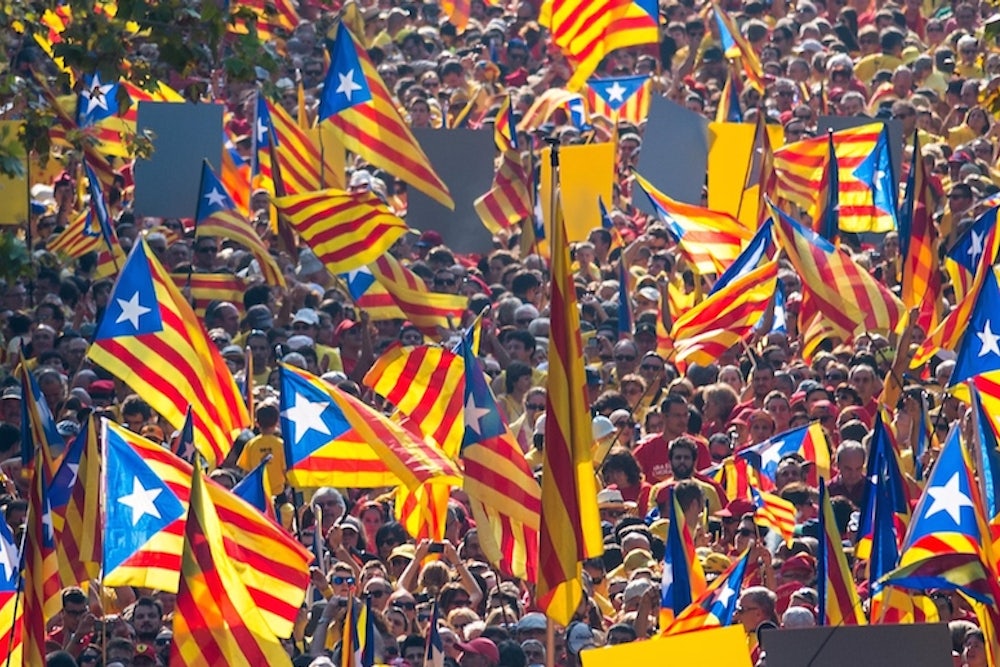Perhaps the greatest disappointment at Scotland’s failed independence referendum was not felt in Scotland itself—which, after all, rejected the measure by a wider margin than expected—but in Cataluña. Separatists there watched the referendum closely, hoping it could set a precedent for their own cause. They didn’t get one, but Catalans are pressing forward anyway with their own campaign and nevertheless applauded the referendum as “a celebration of democracy,” a pointed dig at the central government that highlights the turmoil in Spain.
Spanish President Mariano Rajoy has repeatedly blocked Catalans’ attempts to stage a referendum since his election in 2011, using the Spanish Constitution as justification. The Constitution, adopted in 1978 after the death of dictator Francisco Franco, does in fact enshrine national unity: “The Constitution is based on the indissoluble unity of the Spanish Nation, the common and indivisible homeland of all Spaniards.” Rajoy has interpreted this to mean that any referendum that does take place must be called by the central government, and all 47 million Spaniards would have the opportunity to vote on the issue.
Nonetheless, Catalan regional president Artur Mas is determined to hold a referendum. Last Friday, the Catalan Parliament voted overwhelmingly, 106 to 28, to give Mas the legal power to call a referendum despite the dictates of the Spanish Constitution. He’s scheduled it for November 9, just over a month away. Spain’s Constitutional Court, nudged by Rajoy, is expected to block it, which would make the November referendum impossible and set off a constitutional crisis.
Rajoy is so vehemently against a Catalan referendum that he even started a war of words with Scottish First Minister Alex Salmond in the days before the Scottish vote. He and his ministers threatened to block Scotland’s entry into the European Union and prophesied economic peril and European catastrophe should Scotland have left Great Britain. His reticence is understandable, to some degree: Cataluña is one of the wealthiest regions of Spain, contributing about 20 percent of the GDP. A separate Catalan state would devastate an already struggling Spain economically.
But by resolutely denying a vote and stubbornly refusing to even entertain a discussion, Rajoy is only exacerbating matters. As the country grows more polarized, Catalan independence grows more popular and the protests are only getting bigger. 1.2 million people protested in the streets of Barcelona in 2010; this year it was up to almost 2 million. According to the Center for Opinion Studies in Cataluña, support for independence has gone from 19 percent in 2010 to 48.5 percent at the end of 2013. The latest numbers, released on Monday, found that nearly 60 percent support it. Spain’s dire economic situation has exacerbated nationalist sentiment, as Catalans feel they can do better without the rest of the country, but these numbers suggest that the situation will only grow worse the longer Rajoy unilaterally avoids it.
If he did choose to confront the problem head on, Rajoy might take solace in the Scottish situation. If Scotland taught the world anything last week, it’s that allowing people to vote—and 84.5 percent of Scotland’s eligible voters did so—does not mean they will choose independence. As Rajoy rightfully argues, and as the Scottish realized, forging a new nation is a daunting and extremely risky undertaking that voters ultimately eschew. Both the U.K. and Canada have both weathered strong independence referenda and remained intact. The referenda do not usually lead to independence, but are the means to enact change. The Scottish Parliament is set to make substantial gains in autonomy, while the Québecois gained control over education, cultural, taxation, and immigration policy as a result of their two referenda. There’s no reason why Cataluña could not go the same way—as long as the central and regional governments can work together in a democratic way.
But the Spanish government doesn’t seem to understand. Instead of listening to popular opinion, Rajoy prefers to hide behind constitutional language. Rajoy has sworn that he will “uphold the constitution and the law” and that “any discussion or debate on this is out of the question.” He’s terrified that a referendum would tear the nation, and its relatively young democracy, apart. But by denying his people the opportunity to exercise their democratic rights, he’s only making the situation worse.
